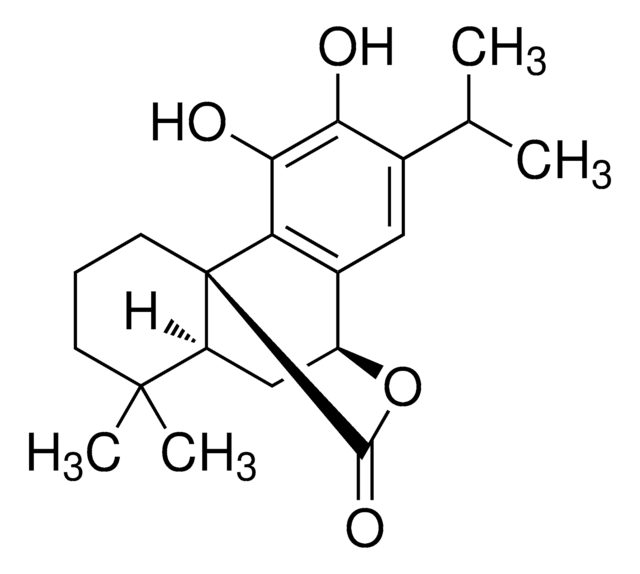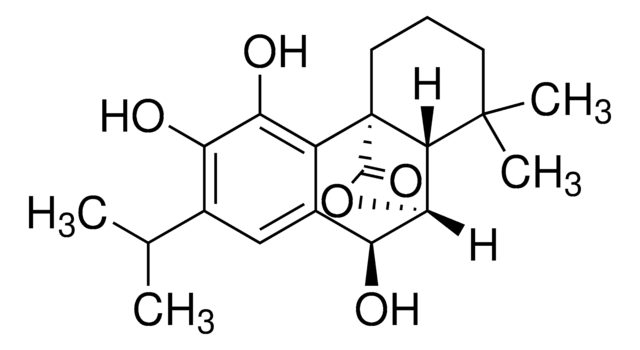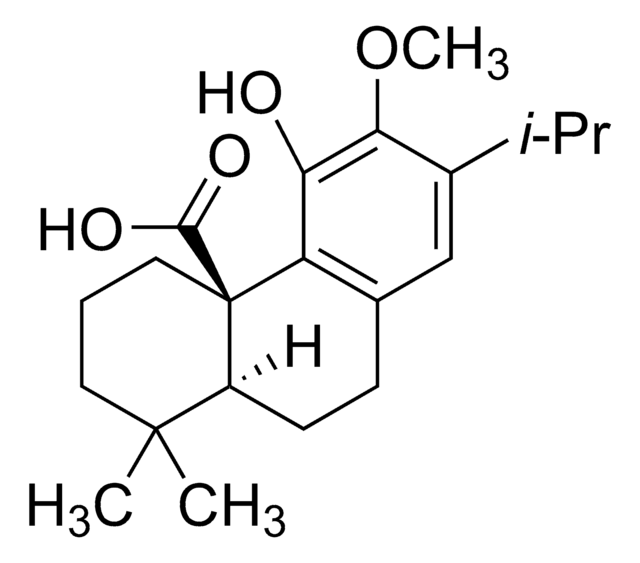C9617
Carnosol
Sinonimo/i:
Picrosalvin
About This Item
Prodotti consigliati
Origine biologica
Rosemarinus officinalis L.
Forma fisica
powder
applicazioni
metabolomics
vitamins, nutraceuticals, and natural products
Condizioni di spedizione
dry ice
Temperatura di conservazione
−20°C
Stringa SMILE
CC(C)c1cc2[C@@H]3C[C@H]4C(C)(C)CCC[C@]4(C(=O)O3)c2c(O)c1O
InChI
1S/C20H26O4/c1-10(2)11-8-12-13-9-14-19(3,4)6-5-7-20(14,18(23)24-13)15(12)17(22)16(11)21/h8,10,13-14,21-22H,5-7,9H2,1-4H3/t13-,14-,20+/m0/s1
XUSYGBPHQBWGAD-PJSUUKDQSA-N
Cerchi prodotti simili? Visita Guida al confronto tra prodotti
Categorie correlate
Descrizione generale
Applicazioni
- to test its anti-cancer and anti-proliferative activities on cancer stem-like cells (CSCs) and Glioblastoma multiforme (GBM) cells
- to inspect its anti-carcinogenic effects on nineteen genes involved in up-and down-regulation of different genetic carcinogenesis pathways and on HeLa cells in human cervical cancer model
- as a reference standard to identify and quantify the metabolites of rosemary extract using liquid chromatography coupled to tandem mass spectrometry (LC/ESI-MS/MS)
Azioni biochim/fisiol
Avvertenze
Warning
Indicazioni di pericolo
Consigli di prudenza
Classi di pericolo
Skin Sens. 1
Codice della classe di stoccaggio
11 - Combustible Solids
Classe di pericolosità dell'acqua (WGK)
WGK 3
Punto d’infiammabilità (°F)
Not applicable
Punto d’infiammabilità (°C)
Not applicable
Certificati d'analisi (COA)
Cerca il Certificati d'analisi (COA) digitando il numero di lotto/batch corrispondente. I numeri di lotto o di batch sono stampati sull'etichetta dei prodotti dopo la parola ‘Lotto’ o ‘Batch’.
Possiedi già questo prodotto?
I documenti relativi ai prodotti acquistati recentemente sono disponibili nell’Archivio dei documenti.
I clienti hanno visto anche
Il team dei nostri ricercatori vanta grande esperienza in tutte le aree della ricerca quali Life Science, scienza dei materiali, sintesi chimica, cromatografia, discipline analitiche, ecc..
Contatta l'Assistenza Tecnica.












